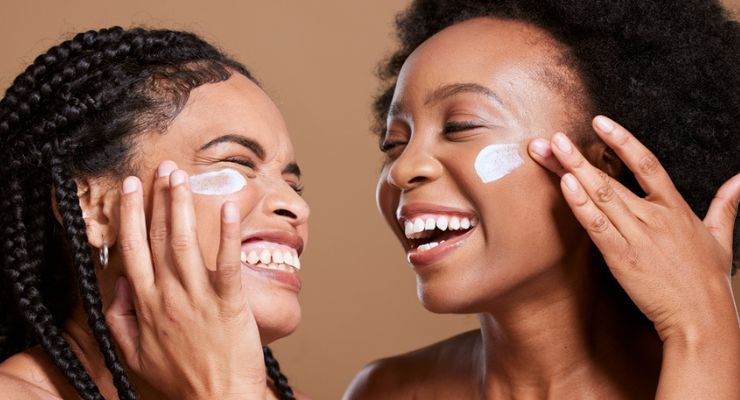10.12.23
The Estée Lauder Companies Inc. shared its latest clinical research findings in a keynote address and podium presentation at the 33rd International Federation of Societies of Cosmetic Chemists (IFSCC) Congress, held in Barcelona, Spain, in September.
Nadine Pernodet, PhD, Senior Vice President, Bioscience, ELC, and Estée Lauder brand Lead Scientist, addressed innovation in the beauty industry in a lecture entitled, "Harnessing Epigenetics: from Anti-Aging to Age Reversal."
Meanwhile, Mei Yu, MD, PhD, Executive Director, Clinical Translation, Global Clinical & Consumer Science, Global R&D, ELC, presented a translational clinical study titled, "Development and validation of post-inflammatory hyperpigmentation (PIH) model in multi-ethnicities using different induction methods."
Data shared included from Dr. Pernodet's work on circadian rhythm, microRNAs, mechanobiology, and longevity proteins, exploring how the microenvironment and macroenvironment alter skin cell activities. This body of research is central to the ongoing development of approaches that enable innovations to shift from anti-aging to age reversal.
"Fifteen years ago, we realized the impactful role epigenetics could play in skin aging, and it is now well-recognized in the scientific community that 75% of the aging process is directly related to epigenetics," said Dr. Pernodet. "I'm honored to have been selected to present a keynote lecture at the IFSCC conference this year to share the latest in this groundbreaking science that is transforming the beauty industry. As the industry leader in this research, we remain committed to finding new opportunities to understand how our environment and lifestyles impact skin cells so we can move toward age reversal."
The study showed a reliable methodology to induce and evaluate the progression of PIH and to help develop treatment options for the resolution and prevention of PIH across multiple Fitzpatrick skin types.
The team followed the time courses of inflammatory response and pigmentation for three different PIH induction methods in Caucasian, Asian, and African American study participants to identify the optimal induction methods to evaluate anti-hyperpigmentation technologies.
"This work represents a significant advancement because it helps facilitate better understanding of the dynamic development and progression of PIH as well as post-inflammatory erythema (PIE), their underlying mechanisms, and their manifestations across skin phototypes and ethnicities," said Dr. Yu. "Implementing this protocol will better enable the development of novel and fully inclusive treatment options for its resolution."
The work presented by ELC scientists at the 33rd IFSCC Congress reflects advances in ELC's core scientific platforms, including epigenetics, as well as its commitment to pursuing research that is inclusive of skin types and ethnicities from around the globe in order to develop methods, technologies, and products that meet the needs and desires of its diverse consumers.
Nadine Pernodet, PhD, Senior Vice President, Bioscience, ELC, and Estée Lauder brand Lead Scientist, addressed innovation in the beauty industry in a lecture entitled, "Harnessing Epigenetics: from Anti-Aging to Age Reversal."
Meanwhile, Mei Yu, MD, PhD, Executive Director, Clinical Translation, Global Clinical & Consumer Science, Global R&D, ELC, presented a translational clinical study titled, "Development and validation of post-inflammatory hyperpigmentation (PIH) model in multi-ethnicities using different induction methods."
Findings on Epigenetics
As part of the keynote presentation, Dr. Pernodet highlighted ELC's research over the past 15 years and findings on how epigenetics—through the influence of external environment and lifestyle—directly impacts skin aging. She also explained that, with the right technologies, understanding the positive and negative epigenetic signals provides the ability to reverse skin aging.Data shared included from Dr. Pernodet's work on circadian rhythm, microRNAs, mechanobiology, and longevity proteins, exploring how the microenvironment and macroenvironment alter skin cell activities. This body of research is central to the ongoing development of approaches that enable innovations to shift from anti-aging to age reversal.
"Fifteen years ago, we realized the impactful role epigenetics could play in skin aging, and it is now well-recognized in the scientific community that 75% of the aging process is directly related to epigenetics," said Dr. Pernodet. "I'm honored to have been selected to present a keynote lecture at the IFSCC conference this year to share the latest in this groundbreaking science that is transforming the beauty industry. As the industry leader in this research, we remain committed to finding new opportunities to understand how our environment and lifestyles impact skin cells so we can move toward age reversal."
Addressing Ethnic Differences in Skincare
Consistent with ELC's commitment to diversity and inclusion in its product offerings, Dr. Yu's podium presentation emphasized the need to develop optimal protocols and methodologies to address ethnic differences.The study showed a reliable methodology to induce and evaluate the progression of PIH and to help develop treatment options for the resolution and prevention of PIH across multiple Fitzpatrick skin types.
The team followed the time courses of inflammatory response and pigmentation for three different PIH induction methods in Caucasian, Asian, and African American study participants to identify the optimal induction methods to evaluate anti-hyperpigmentation technologies.
"This work represents a significant advancement because it helps facilitate better understanding of the dynamic development and progression of PIH as well as post-inflammatory erythema (PIE), their underlying mechanisms, and their manifestations across skin phototypes and ethnicities," said Dr. Yu. "Implementing this protocol will better enable the development of novel and fully inclusive treatment options for its resolution."
The work presented by ELC scientists at the 33rd IFSCC Congress reflects advances in ELC's core scientific platforms, including epigenetics, as well as its commitment to pursuing research that is inclusive of skin types and ethnicities from around the globe in order to develop methods, technologies, and products that meet the needs and desires of its diverse consumers.














